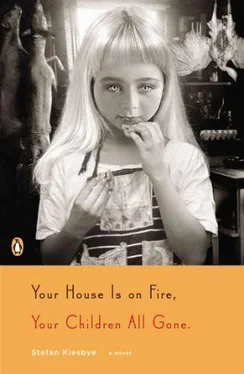“I wonder if she’s ever done it,” Heike said. She was Heidrun Brodersen’s daughter and the biggest of our small group, with large breasts and a belly. Boys were wild about her, God knows why, and we suspected she had done it, since she brought up the topic every chance she got. Her face grew red and her eyes looked expectantly at us. We liked her the least.
“Maybe,” Sylvia said. “Maybe when she was our age. Can you imagine her taking off her clothes now?” Sylvia wore a wreath of daisies in her flaxen hair. We’d played “Rapunzel,” yet without enthusiasm. It was hot and the skies hung low, and we sat on the remains of the church walls, which were made from large fieldstones, and our arms and legs were glistening with moisture. Little trees and bushes sprouted in cracks and fissures; we could hear the swallows cutting the air around us. We were bored, and we hated Käthe for showing us every day of the week what might happen to us if we stayed in Hemmersmoor. When Anke suggested we arrange a rendezvous for Käthe, it was a done deal.
It wouldn’t be hard to give Käthe a letter and convince her that one of the village men had sent it through us. She was fat and ugly and terrified, but the barrettes in her wispy hair and the lace sewn to her shirts spoke volumes. Yet it was harder to decide on her suitor. Who would want to spend a night with Käthe? We had to be inventive.
“Jens Jensen,” Anke suggested. “He’s ideal. He’s a drunk and won’t know who he’s with anyway. His wife doesn’t care if he sleeps around. She’ll be safe from him for a day.”
“Yes,” Sylvia said. “Jensen is a good choice.”
Anke with her dark, shiny hair and smooth skin, Anke with her full lips and white teeth, smiled. Smiled and nodded.
“Let’s take the apothecary,” I said.
“His wife is jealous,” Anke objected. “He’ll never do it.”
“The apothecary,” I said. “We’ll take him.”
Sylvia shrugged. “We can try. But he’ll never go for Käthe. We’d have to pretend he’s meeting with someone else.”
“Heidrun Brodersen,” I said.
“Genius!” Heike shrieked, and for once I was happy for her presence. I had not expected her to agree, but she said her mother was ideal. “She’s as fat as Käthe. In the dark he won’t know it’s her until it’s too late.”
“In the dark?” Anke said.
“It’s got to be dark, for sure,” Heike said. “Oh boy, it’s going to be fun.”
Heidrun Brodersen was a good bet. Men loved her, and rumors crept through Hemmersmoor about nights she did not spend at home and nights her husband spent at Frick’s making sure not to return home until after midnight, downing paid-for drinks until he was nearly dead. Yet I wasn’t interested in what happened to her or her reputation. I wanted the apothecary. How I would enjoy watching him in the arms of Käthe Grimm. I couldn’t wait.
The first task proved to be as easy as we’d anticipated. One morning, when the streets were empty beneath a blue sky that could convince anybody there had to be a world beyond Hemmersmoor, I found Käthe on a bench in the village square. She’d been at the bakery, buying sweet rolls and éclairs, and she sat smiling in the sun, taking a bite from a dry roll, then pushing part of an éclair into her already full mouth. Finally she took a third bite, from the roll again, and her cheeks were ready to burst. Only now did she start to chew, crumbs and flecks of custard raining down onto her shirt. The smile stayed on her lips even as she chewed.
“Here,” I said and handed her the letter. “A man gave it to me.”
Käthe stared at me, forgetting to work on the rolls and éclair. “Who?” she said.
I waited until she was done spitting and coughing before shrugging. “I can’t say.” Then I ran off.
The change in Käthe was tremendous. The rendezvous was not until Friday night, three days away, but by that afternoon she was already a different person. She still screamed, still talked nonsense about skeletons and maids milking the beams of cowsheds and potatoes flying through barns like swallows. Yet that first afternoon after receiving the letter, she wore a yellow dress we’d never seen before, a ridiculous rag that didn’t fit the color of her skin or hair but which she presented to Hemmersmoor with an air about her as though she were the princess of Egypt.
Our second task was harder, and I tried to get out of it, but since I had suggested the apothecary as our male suitor, Sylvia, Anke, and Heike insisted. I had no choice.
It took me all afternoon to find him alone in his store. His wife, Rosemarie, often served customers who wanted bandages or cough syrup, and for two hours, I stood on the village square and watched Käthe showing off her yellow dress and talking gibberish. My heart wanted to force itself out of my throat, I was tempted many times to hurry home; only the sight of Käthe and her shiny pink skin and dull hair made me stay.
The bell above the door rang, announcing me. From behind the old counter, Friedrich Penck lifted his gaze. Around him glass jars were neatly arranged on dark wooden shelves. The shop smelled cleaner than anything else in our village, as if the foul air and low lives in Hemmersmoor were unable to touch it. If you closed the door and didn’t look at Frick’s or Meier’s across the square, you might have been in Hamburg, or even in a different country.
Penck wore metal-rimmed glasses and stood as erect as a large and curious bird. A strange calm smoothed his narrow face and commanded respect. I never heard anyone raise his voice to him.
He looked sternly at me and said, “Get out.”
I shook my head.
He touched his neatly trimmed beard, following its contours with two fingers. “I told you to never come to my store again.”
I nodded.
“So what do you want?”
I stayed silent, my face hotter than my hands. The letter I held was soaked with my sweat.
“I will call the Gendarm if you don’t leave,” he said politely.
“I didn’t steal,” I finally said, and was mortified by the shrill whine of my voice.
“Of course you did. Listen, Linde. I’m sorry about what happened to you, but you can’t take things. Leave now, please.”
I shook my head again and stepped forward. I thrust the letter onto the counter separating Penck and me. This made him raise his brows. His nose seemed to grow thinner and longer, as if he wanted to smell what was inside the purple envelope.
“What is this?” he asked flatly. “An apology? It’s not necessary. Children can be cruel, and I’m sure you thought my creams could solve your problems.”
“It’s a letter from someone,” I croaked. My scars were burning, hot lines cutting my face, fiery red lines that remembered the breaking glass and my face cutting through it, remembered the hand that held my hair and pushed, then pulled back and pushed again.
“From whom?” Mr. Penck said.
“I can’t say,” I said. “I’m sorry for what I did.” My tongue burned as much as my face; I could barely move it. But this needed to be said, my mission depended on it.
Before I reached the door, the apothecary called me back. He’d opened the letter and was putting it into his coat pocket so hastily that he crumbled the purple paper. “Wait,” he said again, and met me with a pot of cream in his hand. “I’m sorry too. I might have been too harsh.” He pressed the makeup into my hand and briskly turned around, vanishing into the back of the store.
I could hardly breathe and closed my eyes to keep from crying. Last February Mr. Penck had caught me, taken me by the arm, and dragged me to my parents’ house. They had looked at each other with sad faces, and my dad had nodded silently. He had paid Penck for the makeup even though I no longer had it on me. Then he’d sent me to my room and never talked about the theft again. He knew the boys were still mocking me. “Mincemeat,” they called me.
Читать дальше












